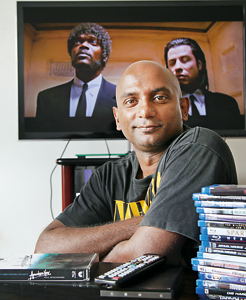Revisiting old favou rites on his blu-ray
One imagines that somewhere on Prasad Pereira’s list of life’s essentials, you’d find ‘watching movies’ noted down just under ‘air,’ ‘water,’ and ‘food.’ “I’ve always been mad about cinema since I was really, really young and film making is very important to me,” he says, “it’s more than a career, it’s one of those things that makes life all the better for living.” And what’s a film without something to watch it on?

Prasad: Mad about movies since childhood. Pic by M.A. Pushpa Kumara
Having bought a spanking new blu-ray player and a compatible T.V in April, Prasad has been revisiting some of his favourite films – beginning with Francis Ford Coppola’s iconic ‘Apocalypse Now’.
At the moment he considers it the leading candidate for the “greatest film of all time” (plus it’s “fantastic on blu-ray”). “Though it takes place in the theatre of war, it is more about the human experience,” he says. Set in Vietnam during the war, ‘Apocalypse Now’ was profoundly influenced by the writings of Joseph Conrad.
Famously, for Coppola making it was an utterly harrowing experience: his lead actor Martin Sheen had a heart attack, a gargantuan and tardy Marlon Brando turned out to have never read Conrad’s novel (or even his own script), a typhoon destroyed their sets and Coppola shed 100 pounds of weight over 200 hours of filming. The movie then took close to two years to edit and was all but written off before it became a surprise hit. For fans like Prasad none of this lessens its extraordinary appeal. “It’s a journey into the heart of man’s own darkness. That was the film that taught me that just because a film is big doesn’t mean it can’t be about personal themes,” he says.
At work, Prasad’s designation is often AD or Assistant Director. He has a number of commercials and four films under his belt – namely ‘Machang’, ‘The Emden Men’, ‘Vara: A Blessing’ as well as Deepa Mehta’s adaptation of Midnight’s Children. He’s also on the first draft of his own screenplay.
When he’s working, he likes to tailor the theme and style of his movie schedule to match his current project. “Filmmaking is something that comes not through book learning but from experience and instinct and the best way to develop instinct is to watch more movies…and if you’re a filmmaker, to make more movies. The ‘watching more movies’ bit of it comes easier I guess,” he says.
His shelves are laden with an eclectic mix of established classics like ‘Citizen Kane’ and cult favourites like ‘Pan’s Labyrinth’, but Prasad also has his little guilty pleasures. “A couple of those old eighties action movies will probably make the cut,” he says, naming ‘Die Hard’ and ‘Rambo: First Blood’. Quentin Tarantino gets a nod for great dialogue and Aaron Sorkin wins praise for ‘The Social Network’ – Sorkin took what could have been an uninspiring film about geeks writing code and instead “constructed one that spoke of the society that gave birth to such a movement,” says Prasad.
Watching these films, Prasad may notice a beautifully executed single take or be interested by how foreshadowing is used so that a scene’s relevance is only explained much further into the movie. However, between his work and his own writing project he says he is becoming increasingly interested in the way filmmakers construct their stories.
“These days I tend to notice the movement of the film – how the characters are introduced, how they are set up, how the movie progresses,” he says.
He’s also pleased to find the technology improving all the time. His blu-ray is a step up from your average DVD player – dramatically better clarity, improved sound and additional features “make it all that much more highly developed” – and such systems are getting ever more affordable.
“Now that they give you a higher quality of what you experienced before, I’m happy it was invented,” says Prasad, but his blu-ray isn’t one of the things he’d grab on his way out if his apartment ever caught fire. He’s invested in the function of the device rather than the thing itself. “Conveniently, if I lose it, I could get another without any hassle,” he says, well pleased with his lot.
Follow @timesonlinelk
comments powered by Disqus

























